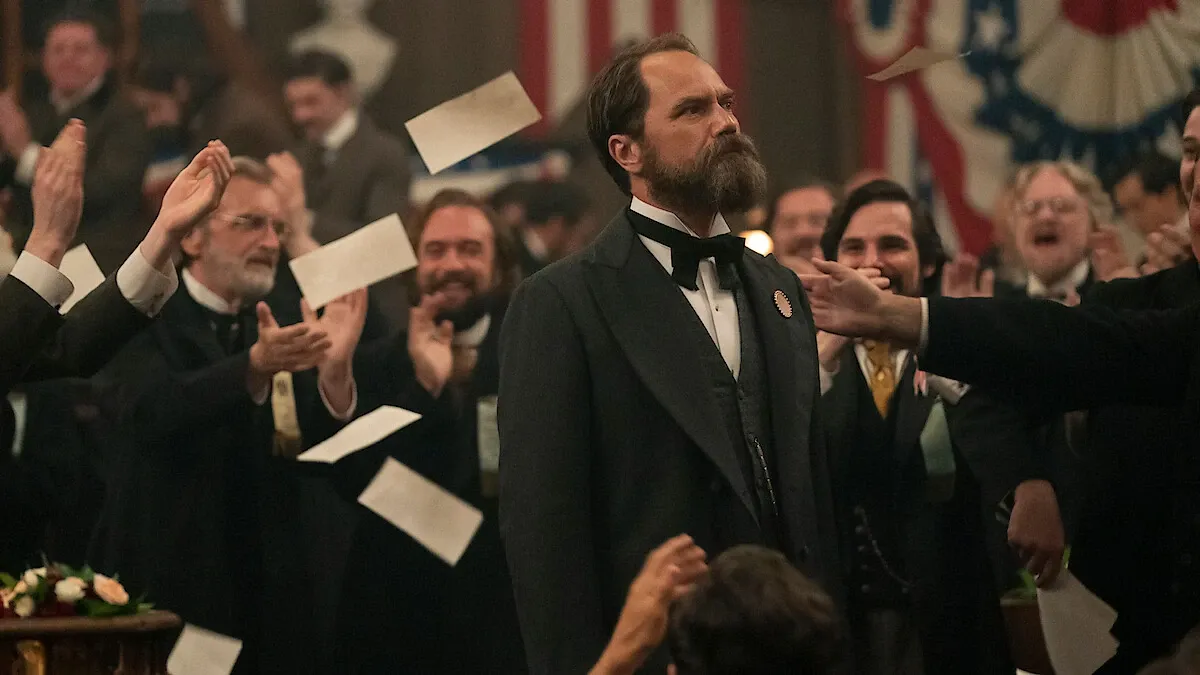★★ | Good intentions
I didn’t enjoy PROMISING YOUNG WOMAN. This isn’t to say it’s meant to be enjoyable; it is, after all, about rape and the consequences of rape culture. But I also found it surprisingly toothless in its satire, aimless in anger, and, ultimately, uncertain where it fits in the grand scheme of things.
Now, as a disclaimer, it’s important to point out that I’m a white, queer, cis-male. I have all the privilege and an infinitesimally small understanding of what it’s like to be a woman in a patriarchal society. Some films have taught me a lot about it. But ultimately, my capacity here is limited to empathy. I am, to borrow a term from another hobby, rolling at a disadvantage to understand.
In fact, far smarter writers than myself have written — and will write — about PROMISING YOUNG WOMAN. I recommend reading them first.
Cassie is the eponymous PROMISING YOUNG WOMAN, as played by Carey Mulligan. She’s a med school dropout now in her thirties, working in a small café with a distant friend and boss, Gail. Her parents, rather unsubtly, try to push her out into the world again. But Cassie refuses. She’s untethered, angry, and with a mind only on one thing: revenge.
So every week, she puts on her most provocative clothes and heads out into bars, pretending to be fall-down-drunk, well past the point of consent, so that a man might take her home to assault her. Only when they get to their destination, Cassie turns the tables on them, revealing herself sober and furious, with instant comeuppance ready to be served.
It’s an intriguing and captivating proposition, turning the usual tropes of abused women on their head, forcing active members of rape culture into victims themselves. The opening scene, which leaves the fate of the abuser vague for a time and instead cuts to Mulligan triumphantly walking home the next day, a subversion of the walk-of-shame, is fantastic. It’s an excellent tone-setter that strips the narrative of established expectations and presents a slew of others instead.
Almost immediately, director and writer Emerald Fennel loses the plot, and PROMISING YOUNG WOMAN turns aimless in its approach. The film quickly reveals that Cassie doesn’t actually do anything to her abusers. Instead, she scolds them, prodding them over their behavior, and then leaves. The opening scene, so intense in its semblance of justice that only this type of vigilantism provides, turns sour as Fennel repeats it three times over.
What’s worse is the film casts actors as the abusers who’ve made careers of playing easily identifiable sleazebags. In their hands, abusers turn into caricatures you could pick out from any room. Most notable is Christopher Mintz-Plasse, playing a douchey wannabe writer who quotes Gravity’s Rainbow and forces Cassie to take drugs. There’s an air of malice and danger that permeates these scenes, as I constantly wished for Cassie to drop the charade before things got out of hand.
Yet it’s here that Fennel pulls the biggest punches. As Cassie turns the tables, revealing herself in control, each man turns into a simpering coward — horrified at the thought of an alert and awake woman before them. It’s an interesting thought, essentially purporting that beneath the violent posturing that permeates rape culture is nothing more than terrified boys, but it’s also reductive and more than a little dangerous. (The film does eventually address this, but at a point which will undeniably split audiences down the middle).
Part of why PROMISING YOUNG WOMAN feels like it fails to hit the mark is because I couldn’t get a sense of where Fennel wants to direct her anger. It could be everyone, which is certainly justified, but PROMISING YOUNG WOMAN isn’t a nihilistic film. It’s designed, even at its bleakest, to be a cathartic and potentially empowering experience. From the pop-bubblegum aesthetic to the repurposed music of yesteryear hit songs, everything screams the kind of ironic detachment that Diablo Cody famously utilized in the mid-aughts.
But Cassie’s vengeance is fired with buckshot, spreading wide and hitting everything in sight. The film suggests she’s been doing this for a decade, and we glimpse a notebook filled with her conquests. And yet, since the film reveals she merely scolds these men, it leaves a nagging feeling her actions aren’t for the good of others. They’re not even for herself, but Nina, the real victim, whose resulting spiral ended tragically. We never see Nina in the film, and as the story progresses, her name appears less and less until the end.
Fennel’s suggestion of shared victimhood between friends and women is undeniably powerful, and I wish the film would explore it more thoroughly. But Cassie stands singular in her anger and self-flagellation. Every other woman in the movie, including Laverne Cox as the only black woman in the story, is either oblivious or an enemy. Fennel goes as far as to suggest some of these women deserve their place in rape culture. Either by casting them as vapid and stupid or so spiteful, they turn into stereotypes.
In a particularly horrific moment, Cassie gets her friend drunk and tricks her into believing she was raped as a teaching moment. It’s not there to signify how far Cassie is willing to go in her anger, nor is it a morally questionable event that shines new light on her. It’s there, so the audience can go “damn straight” and nod as the other woman learns her place. Elsewhere, she tells a mother her daughter is “stupid, but pretty, which is all she needs,” which is equally dismissive and toxic as anything a patriarchal society creates.
I kept expecting these moments to amount to something more. That a moment of revelation or healing would come, allowing Cassie and the viewer to have a direct and painful conversation of how everyone is an accomplice in a broken society. Instead, Fennel pushes the film further into fantasy, allowing reprieve for just one person in the entire picture. A male lawyer who spent his career smearing the reputation of women who’ve fought their attackers.
That reprieve comes in the form of a Pietà, emphasizing the already clunky religious imagery Fennel repeats in nearly every scene. Cassie may be an avenging angel, but here she’s a saintly mother, doling out forgiveness to the one person who might not deserve it. His appearance in the film is minimal, only serving as a cheap deus ex machina for the end. But the implications left behind troubled me long after I left the theater.
PROMISING YOUNG WOMAN reminds me of another revenge film that shares the same DNA. The other one is THREE BILLBOARDS OUTSIDE EBBING, MISSOURI, starring Frances McDormand. In it, McDormand plays a mother whose daughter is viciously raped and murdered. With no culprit in sight, she simmers and seethes in her rage, lashing out at everyone in her town. It’s a difficult film that also split audiences straight down the middle and offers very little in terms of reprieve. Written and directed by a man, many pointed out how this wasn’t his story to tell, even from strictly a female perspective.
But having seen Fennel’s film, which hits all the same beats apart from the ending, I’m not sure THREE BILLBOARDS got it that wrong either. Or they both did. I can’t tell.
Both are ultimately reductive in several ways, emphasizing only singular elements of complicated topics. Most notably, both minimize the violence minorities face daily, focusing entirely on the experience of white, upper-middle-class women. And yet, neither should ever be expected to represent the entire discussion.
But where I found THREE BILLBOARDS affecting and heart-wrenching, like how McDormand mourns her daughter and herself by recognizing that life moves on even as she cannot, PROMISING YOUNG WOMAN felt so artificial it kept me at arms reach.
PROMISING YOUNG WOMAN puts faith in the police when convenient, as it admonishes the establishment in the same breath. There’s a sense Fennel truly believes that truth or some form of justice will prevail. But here, it feels like an artificial coda, a sprinkling of sugar to coat down a bitter pill. I didn’t find the wild exultation of girl power through tragedy powerful. Nor is it bleakly humorous, either. Instead, I couldn’t help but wonder if its conclusions sour the entire film for the sake of a resounding punchline. There’s no denying it packs a punch, but it’s also like fishing with dynamite. Maybe that’s necessary sometimes.
I’ve gone back and forth with PROMISING YOUNG WOMAN for the last week, and I’m still unsure what I think about it. I’m not even sure if it means it’s bad or not. Meanwhile, some are calling it an example of dangerous white feminism, and their arguments are sound. Others praise it for even tackling this topic altogether.
All I know is that Mulligan is excellent in the lead role, Fennel knows where to place the camera (even if her directing is as subtle as a sledgehammer), and on most levels, PROMISING YOUNG WOMAN is a well-made film.
But because it tries to say everything and nothing at once, it leaves a strange aftertaste. An almost imperceptible feeling that something is not all there, and beyond the initial thrill of bright colors and vivacious presentation, the actual message is more than disquieting.
It’s not a bad film, but certainly the wrong one. At least for now.












